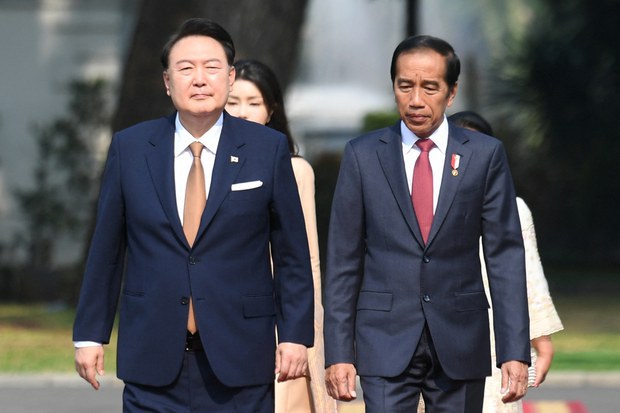South Korea, Indonesia up cooperation to cut supply chain risks, reliance on China
2023.09.08
Seoul
 South Korean President Yoon Suk-yeol (left) and Indonesian President Joko Widodo walk, as they meet at the Presidential Palace in Jakarta, Sept. 8, 2023. [
South Korean President Yoon Suk-yeol (left) and Indonesian President Joko Widodo walk, as they meet at the Presidential Palace in Jakarta, Sept. 8, 2023. [
South Korea and Indonesia have agreed to strengthen cooperation in economic security – a move that would aid U.S. President Joe Biden’s initiative to restructure the global supply chain that de-risks and reduces exposure to China.
South Korean President Yoon Suk Yeol and his Indonesian counterpart Joko “Jokowi” Widodo, met at a bilateral summit in Jakarta on Friday, where they agreed on collaboration in multiple security-related domains, including establishing a secure ecosystem to produce hi-tech materials such as electric vehicles (EVs).
“We look forward to continuing to expand bilateral cooperation in future industries such as electric vehicles, batteries, and smart cities,” Yoon told Jokowi.
“Indonesia, which is a liberal democracy with a market economy, is grounded in the rule of law, where legal rights are guaranteed. This makes it our key partner in ASEAN, in the Indo-Pacific, and beyond.”
“I look forward to working with our key partner, Indonesia, to find ways to contribute to freedom, peace, and prosperity in the Indo-Pacific region,” Yoon added.
Indonesia also sees South Korea as an important partner, Jokowi told Yoon.
The two nations’ move to deepen ties would reinforce the Biden administration’s efforts to solicit help from allies including South Korea to wean off the global supply chain’s dependence on China.
The drive is further evidenced by the introduction of legislation such as the Chips Act and the Inflation Reduction Act (IRA), which are aimed at pressing allies to decrease their dependence on China.
Yoon in April agreed with Biden to strengthen the U.S.-led initiative to restructure the global supply chain in advanced technology. And Indonesia plays a pivotal role in realizing Yoon’s plan.
As one of the world’s leading producers of nickel – a critical component for EV batteries – Indonesia has emerged as South Korea’s crucial economic partner that ensures its economic security.
On Friday, South Korea and Indonesia signed four memorandums of understanding (MOUs), including the two committing to enhance collaboration in infrastructure, research and development, industrial policy, and technology.
These MOUs aim to foster and promote investments in key sectors, including automotive, petrochemical, electrical, and electronics while at the same time, opening potential opportunities to bolster their industrial and technological capacities collaboratively.
On Thursday, companies from the two countries also signed 16 MOUs, including several that aimed to strengthen cooperation on the supply of core minerals and resources, according to a South Korean Ministry of Trade, Industry and Energy statement.
“We will promote economic cooperation [with Indonesia] to develop future industries,” the statement said, adding that the two sides would establish a research center for joint technology development to bridge Indonesia’s rich mineral resources with South Korea’s leading battery industry.
South Korean firms like LG Energy Solution, SK On, and Samsung SDI are in intense competition with Chinese rivals such as CATL, for a larger slice of the global EV battery market.
South Korea’s trade ministry also noted that Indonesia was rich in rare earth material.
That observation may indicate its interest to diversify its rare earth material imports to reduce dependence on China for advanced technology supply chain. Rare earth elements are crucial to a wide range of hi-tech equipment, ranging from smartphones, EVs to defense systems.
China, which holds a dominant position in the global production and processing of rare earth materials, has weaponized the resource as a strategic leverage in international politics. Over the past few decades, Beijing has invested heavily in consolidating its position in the rare earth industry, enabling it to control over 80% of the world’s output.
It has effectively used its monopolistic production against advanced nations, imposing export restrictions as a retaliatory diplomatic measure. In 2010, during a territorial dispute with Japan, China temporarily cut off rare earth supplies to Japan, alerting allies to diversify supply chains.







